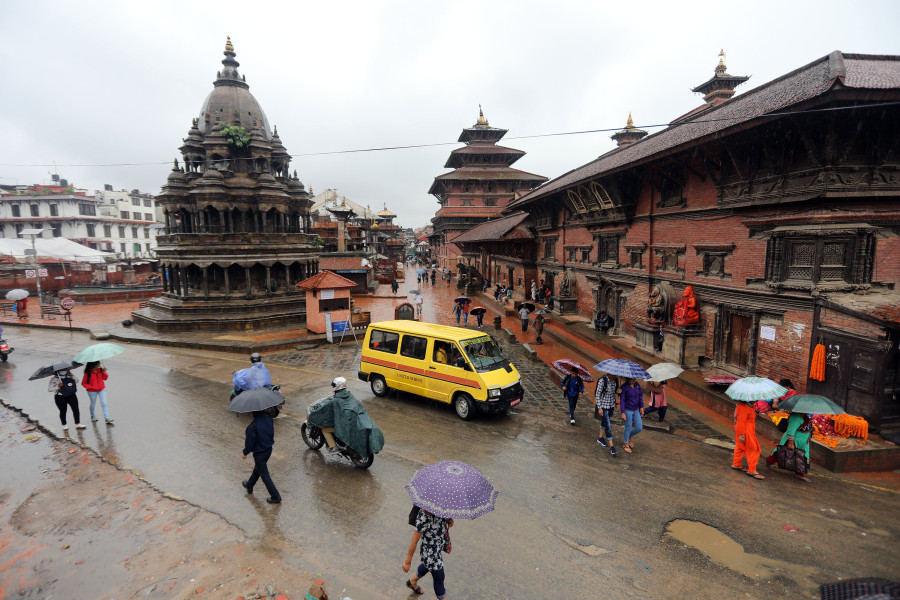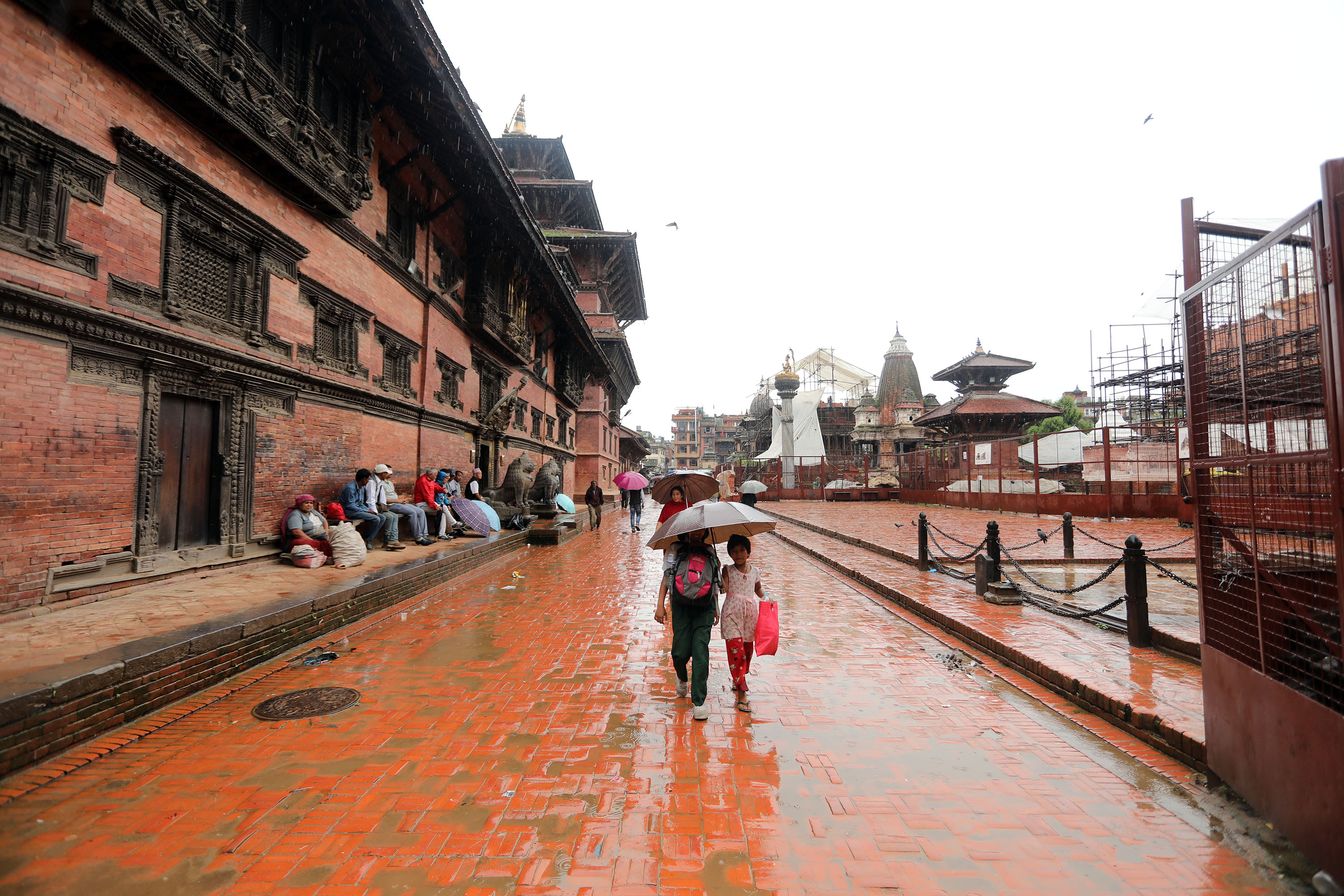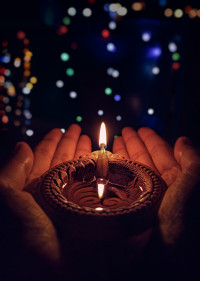As it is
Kathmandu doesn’t make sense, and that’s the beauty of it
Why should I live in Nepal, when so many here seem to be sprinting from the country as fast as they can?
Thomas Heaton
Walking down the dusty road from Kupondole to Thapathali is a visceral experience for a foreigner. There are the mangled roads left in Melamchi Project’s aftermath, the freshly ground jeera wafting through the air, the monger selling various forms of fish, dead or alive—then there’s the tinkers, the tailors, the soldiers, the cops, the ragamuffin mongrels roaming around.
By the time the Bagmati bridge is reached, more humanity has been seen than in a day where I come from. The quotidian 10-minute walk is something I never thought could become normal, and I’m coming to think it has become as quotidian as brushing one’s teeth. There’s tea-slurping old men with cigarettes, firmly placed in the fingers, close to the knuckle murmuring to each other. There’s the chime of the bells as people give prasad to Hanuman on the corner. There’s the dodging of the vehicles being driven by people with questionable skill. There’s the stench of the Bagmati.
Kathmandu is worlds away from where I once was. Every morning, come 7:30, I would be bumper-to-bumper on the Harbour Bridge from Auckland’s North Shore to its centre. I would listen to the radio, listening to the predictable and at-times trivial circadian issues of politics and sport. The rugby team does well, the politician does something wrong. Arrive at work, do the same thing every day—churn, churn, churn some more, then burn out.
But here in Kathmandu, every day is different. When the walk seems to become predictable, Kathmandu creeps up and bashes me over the head. Perhaps the road has been lifted again, and there’s a troop of people working on it. Perhaps there’s a fleet of dogs swimming through the Bagmati, maybe a dead cow or some kids bathing. Perhaps, on a lucky day, the Himalayas will poke their faces from above the smog and grace the Valley with their omnipotent glory.
Having lived in Kathmandu for a sum of 18 months, and working here for a year, I’ve not gotten used to the place. I don’t think I ever really want to. This country bestows knowledge upon inquisitive outsiders and pours until their cups runneth over. There are the complexities of the incalculable cultures, the dichotomy of super-rich and super-poor, the hypocrisy of the politics. There’s the side that seems to be hidden from tourists, and it’s that side of the country that keeps me so interested.
Why should I live in Kathmandu, when so many here seem to be sprinting from the country as fast as they can? This is a question put to me by just about every stranger who comes to know I live and work here. It’s a question that I ask myself, on the bad days, but it’s a question that can only be answered by taking a look at this city.
The conversation typically goes like this, following an argument with a taxi driver trying to fleece me because I’m a kuire.
“Where you from?” the taxi driver asks.
“New Zealand,” I say.
“How long will you be here? One month?”
“Yaha basne,” I often reply, trying to make sure they don’t try to fleece me anymore.

Their shock at the length of time I’ve been here, and the fact that I’m not working on some lofty foreign salary comes as a shock. Money is not a measure of success for me, experiences are. While it’s certainly more comfortable when you don’t have to worry about saving pennies, it’s the experiences that you remember. You can’t take money with you when you die, but you can make sure that you properly lived.
“Why are you here? New Zealand is beautiful.”
They’re always quizzed by the fact I live here, because they always seem to think that New Zealand is this place that’s clean, green and full of opportunity. Sure, the quality of life is leagues above Kathmandu, and seems to be regarded as one of the cleanest in the world.
But, you know what? It’s boring. Perhaps that’s speaking to a form of foreign privilege, that I was able to exit my country for another, and work and know that I can leave anytime, but Kathmandu boasts its own beauty. Yes, the traffic sucks and the pollution sucks the life from its population, but the people, on the whole, are mostly kind and considerate. It’s the people, their stories and their views and their raison d’etre that keeps me here.
Sure, tomorrow I will be back in New Zealand, in my ‘hometown’, for Christmas and I’ll be ankle-deep in hot white sand, looking out at Mayor Island, on the country’s eastern coast. It’ll be sunny, windy and it’s going to be nice.
But nothing will have changed when I get there, or at least I don’t expect it to. More of my friends won’t be around, because they all seem to be chasing dreams in the UK; my grandmothers passed away this year too, so those beloved and steadfast totems have been lost too. My parents will be there, as will my brother, and we’ll be happy celebrating Christmas together. But nothing will have changed. There’s still going to be the local cafe that serves monstrous squares of custard and meat-filled pies.
The air will still be clean and clear, there’ll be the empty roads and occasional cars that interrupt the overwhelming blare of silence. The Pacific will not have stopped crashing on the shore, and it will wave hello to me as I dive into it for the first time in too long.
But give it a couple of days, and there’s no doubt that the quiet will irritate me until my brain swells with boredom. I’ll yearn for the imperfection and adventure that my daily foot-based commute provides, I’ll yearn for the giant brick and wood antiquities, the incessant horns, a never-ending plate of dal bhat and the sweet mouth-lining goodness of milk tea and ripe pong of stale chhyang.
As I board my flight back to New Zealand, I’m saying ‘see you later’ to the city. I’m only away for three weeks, but it will be enough to reflect on the learnings I’ve had in Nepal’s awkward and laborious capital. While people’s cups run over, when it comes to learning new things, I think I’ve got a bucket and it’s not even half full. I’ve still got more to learn, more drops of Nepal to add to the tincture, and I’m looking forward to resuming the cocktail soon.
I know nothing will have changed when I get back, and I’m glad. The road to work will still be stuffed, the fish man will sell his rahu, the tinker will clatter his way down the road, the tailor’s sewing machine will sing its solo as I walk past. The mountains might wink through the clouds too. But the country will be just as enchanting and captivating, and remain a beguiling assault on the senses.




 22.64°C Kathmandu
22.64°C Kathmandu










